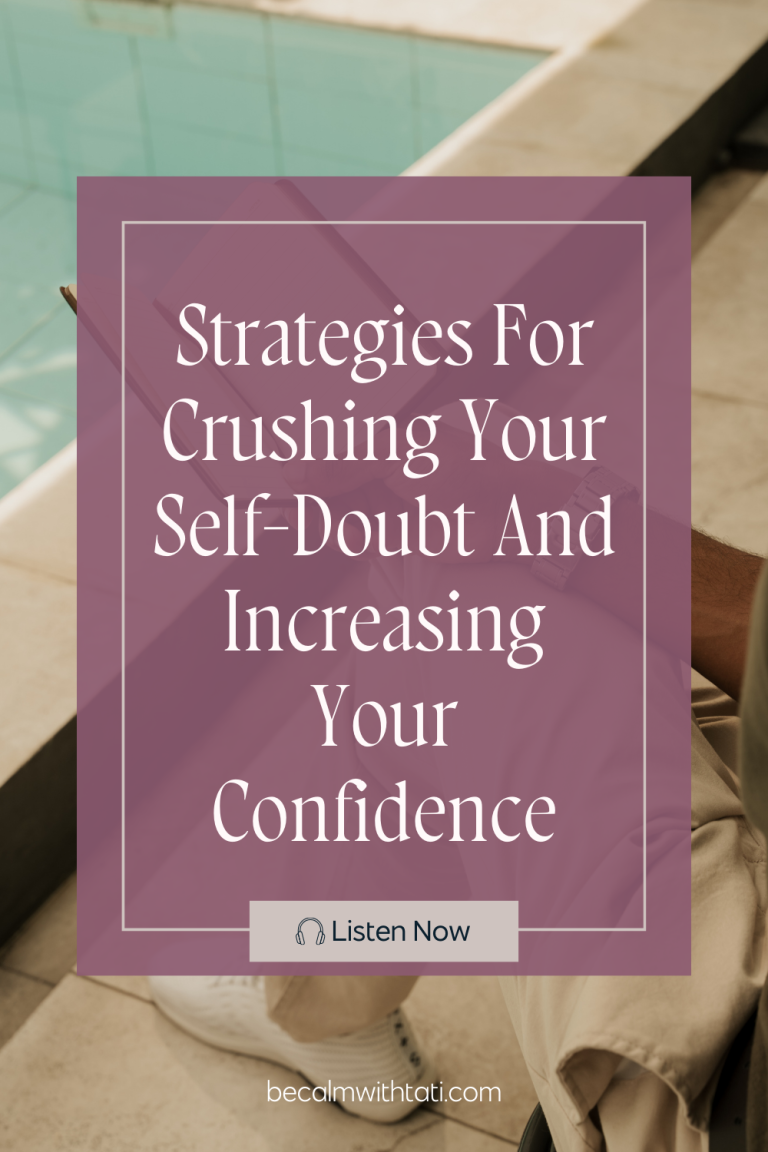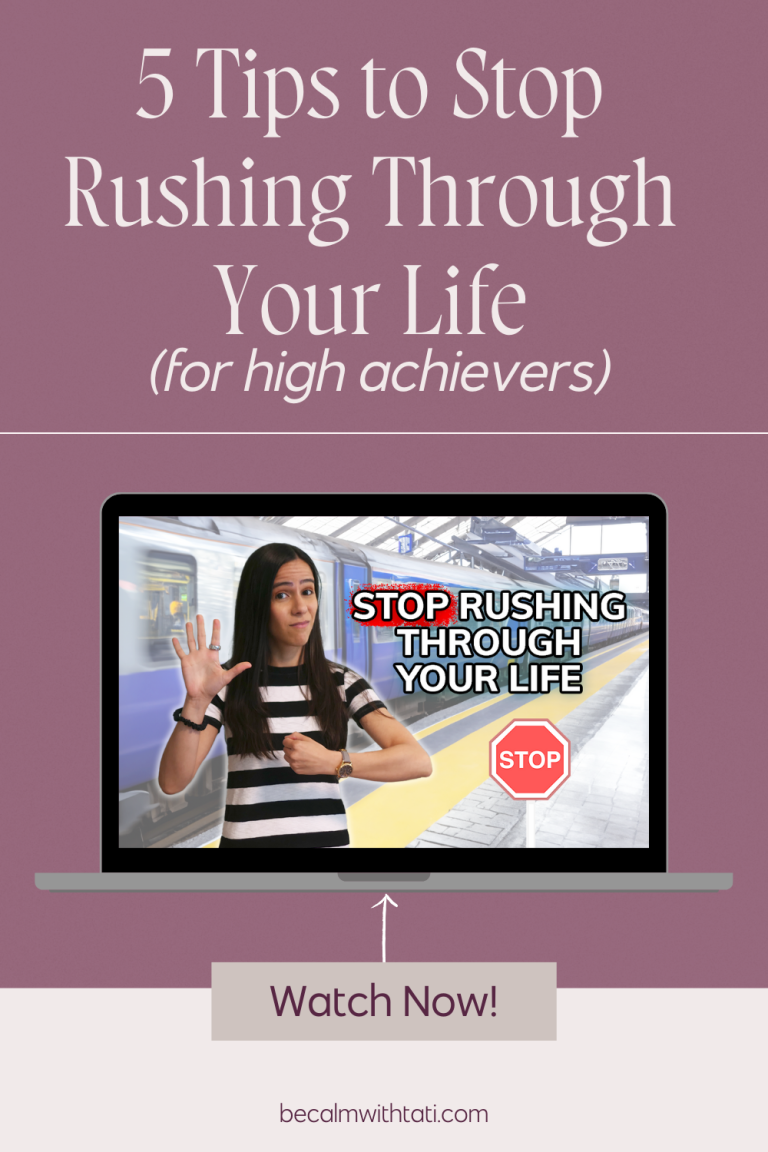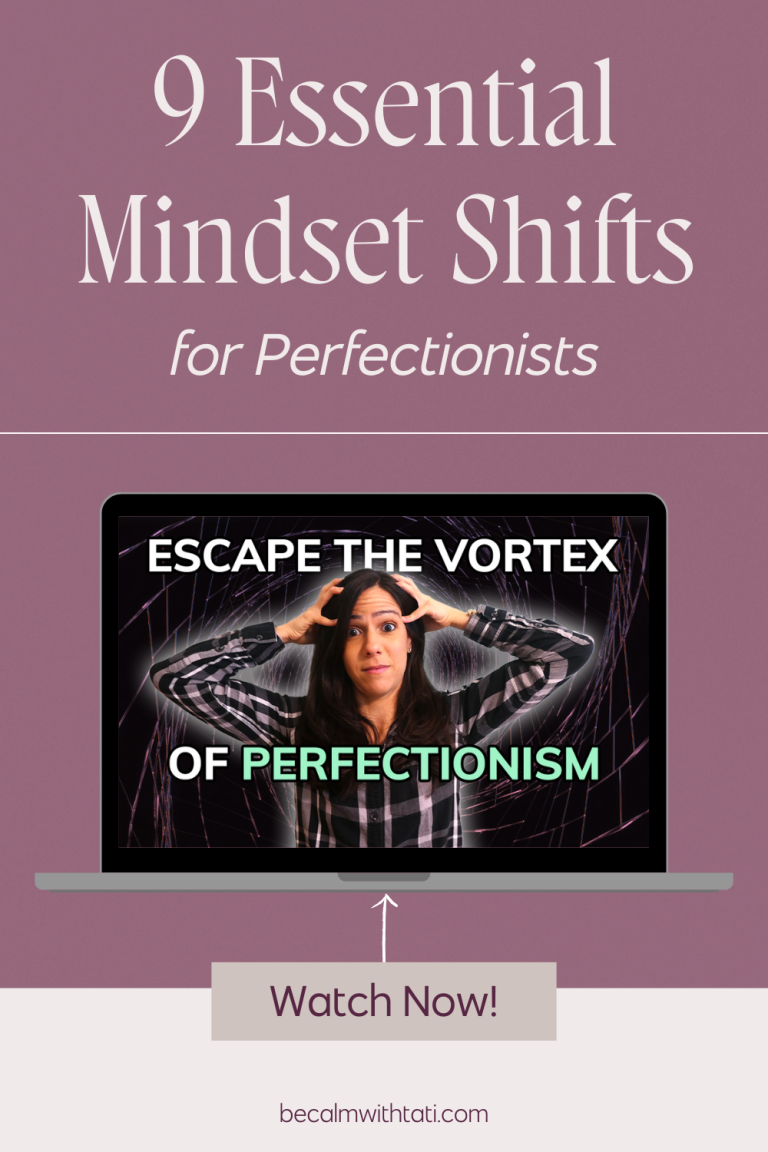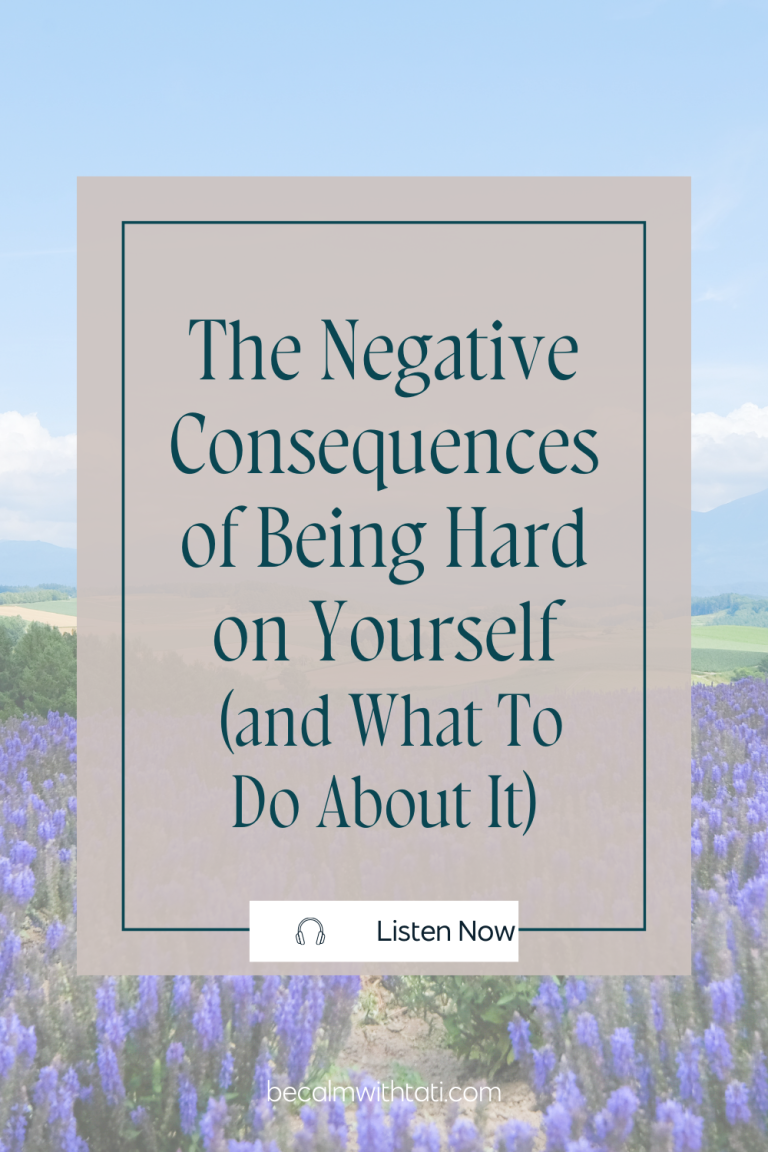Imagine waking up every day feeling drained, anxious, and overwhelmed, all because of a tiny device in your pocket. Your phone, a source of constant negativity, comparison, and pressure to always be connected, is quietly destroying your mental health. In the next few minutes, I’ll share how these subtle yet powerful effects impact you daily and share practical steps to reclaim your peace and mental health.
In this episode, you will learn:
- The 4 significant reasons why your phone is destroying your mental health
- How constantly being connected can put you in a state of anxiety
- Practical tips for how to create boundaries with your phone to improve your mental health
Related:
12 tips to use social media more intentionally: https://www.becalmwithtati.com/12-tips-to-use-social-media-intentionally/
LISTEN NOW:
🎧 CLICK HERE TO LISTEN TO CALMLY COPING WHEREVER YOU LISTEN TO PODCASTS
Sources:
– https://publichealth.jhu.edu/2020/survey-data-confirm-increases-in-anxiety-depression-and-suicidal-thinking-among-u-s-adolescents
– https://www.pewresearch.org/short-reads/2019/07/12/a-growing-number-of-american-teenagers-particularly-girls-are-facing-depression/
– https://www.sciencedaily.com/releases/2017/06/170623133039.htm
– https://www.pewresearch.org/short-reads/2016/11/16/voters-perceptions-of-crime-continue-to-conflict-with-reality/
– https://dartcenter.org/content/violence-comparing-reporting-and-reality
– https://www.psychologytoday.com/us/blog/why-we-worry/202009/the-psychological-impact-negative-news
WATCH NOW:
SUBMIT A MESSAGE, QUESTION, COMMENT OR SUGGESTION TO THE PODCAST: Message
FREE TRAINING: Achieve A Calm Mind, Balanced Life, & Empowered Confidence in 90 Days
If you want to learn how to take back control of your life so you can feel calmer and more confident, and learn the tools to spend your time according to what matters most to you (no matter what your schedule is like right now)…
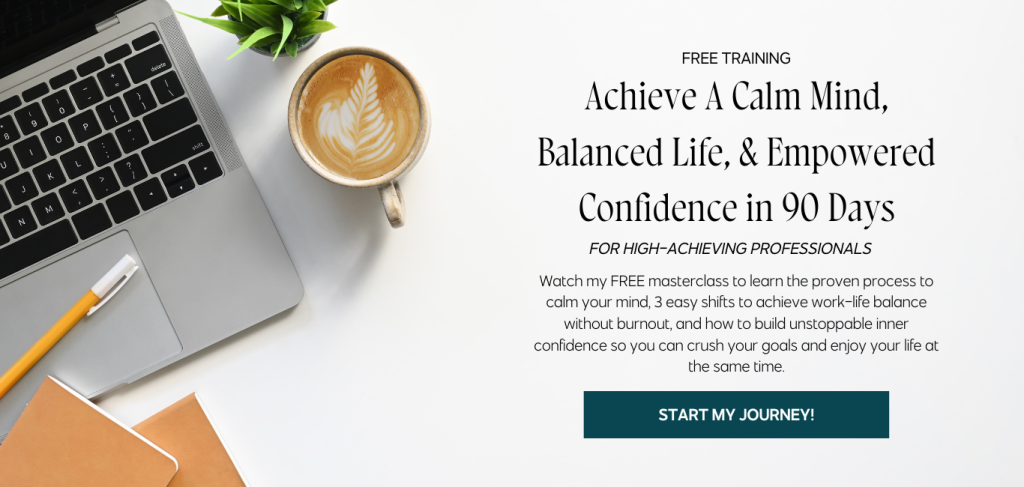
LISTEN, REVIEW, AND SUBSCRIBE TO THE PODCAST!
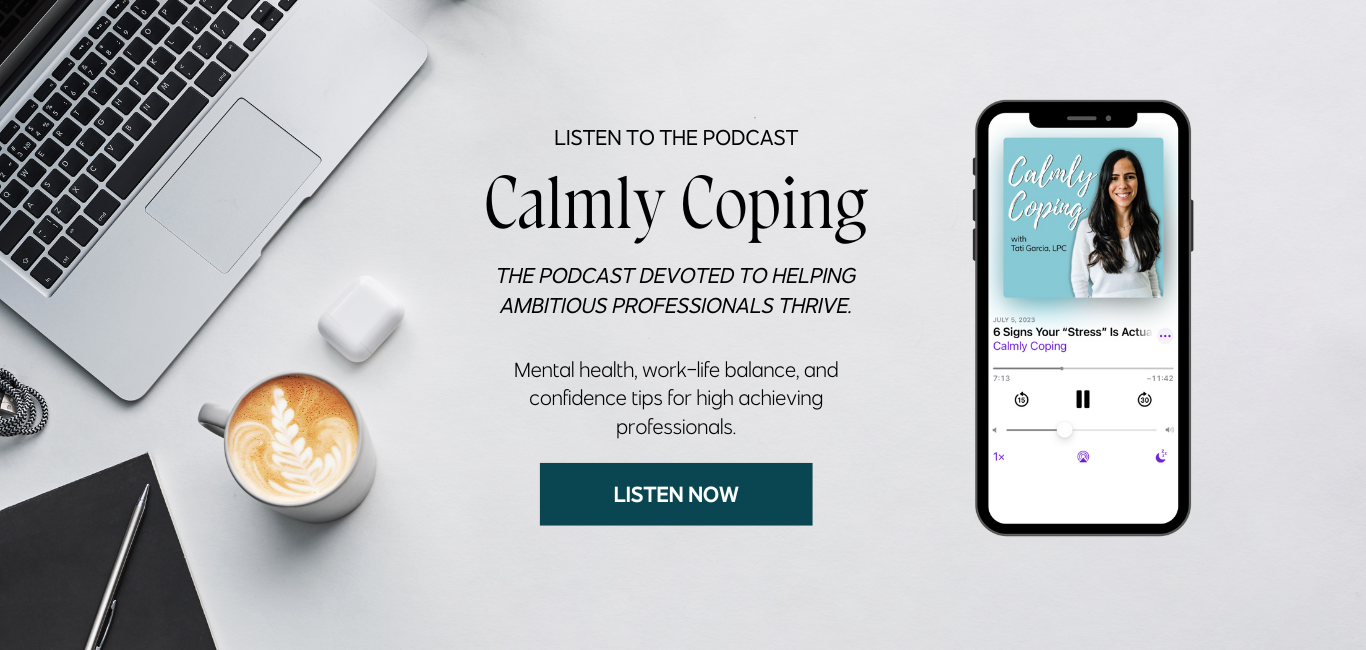
INTRO/OUTRO MUSIC: Rescue Me (Instrumental) by Aussens@iter (c) copyright 2018 Licensed under a Creative Commons Attribution (3.0) license. http://dig.ccmixter.org/files/tobias_weber/57990 Ft: Copperhead
DISCLAIMER: All content here is for informational purposes only. This content does not replace the professional judgment of your own mental health provider. Please consult a licensed mental health professional for all individual questions and issues.
Interested in diving deeper to get support for high-functioning anxiety?
I offer 1:1 coaching to help high-achievers overcoming high-functioning anxiety so they can feel calmer, more present, and have improved balance in their lives. Click here if you’re interested in learning more and getting started.
Calm, Balanced, & Confident is my comprehensive A→Z self-paced course to help high-achieving professionals overcome high-functioning anxiety so they can feel calmer, balanced, and more confident without the anxiety and overwhelm. Click here to learn more and enroll today.
Looking for ongoing support and guidance with high-functioning anxiety? The Calm & Ambitious Community is the exclusive community for high achievers with high-functioning anxiety. Click here to learn more and join us today!
TRANSCRIPT:
Click to view the episode transcript.
Imagine waking up every day feeling drained, anxious, and overwhelmed, all because of a tiny device you keep in your pocket. Your phone, a source of constant negativity, comparison, and pressure to always be connected, is quietly destroying your mental health. In the next few minutes, I’ll share how these subtle yet powerful effects impact your mental health daily and share practical steps to reclaim your peace and mental health.
Welcome to Calmly coping. My name is Tati Garcia and I’m a licensed therapist and coach who specializes in helping high achievers stop overthinking everything so they can feel calm, balanced, and confident from within. Thank you so much for tuning in. I’m not here to vilify phones, although that might seem contrary to the title, but phones can of course be very helpful tools and beneficial to stay connected, to contact emergency services in cases of emergency, to get more information, to keep track of things and so more so phones in and on themselves are not. Evil tools. However, there are many ways that phones are now negatively impacting our mental health. We are becoming increasingly addicted to them, and this is something that is affecting any and everyone. And it’s something that we can’t continue to ignore because it’s not just impacting adults, it’s something that is impacting children and adolescents as well and changing the way that our brains function and behave in the way that we perceive the world around US1.
Huge example of this is that studies have consistently shown that since about 2011, adolescent mental health has been consistently personing. There have been increased levels of anxiety and depression and things have not been improving. And of course, the pandemic did not help with this. However, I’m going to speak about a few of the reasons why your phone is negatively impacting your mental health and what you can do about it. So that you can take control over your phone and use it as a helpful tool to help you progress and do the things that are important to you in life, rather than something controls you and that you feel completely powerless over if you’ve ever found yourself. Scrolling on your phone and looking at stuff, not even remembering picking it up or knowing what it is that you’re doing. Then this episode is perfect for you. First, I want to talk about the constant negativity that we see on news sites and social media. And here’s the thing,
bad and sensational news sells. And it’s something that people, as humans were just genuinely more interested in. You’re not going to see an article, oh, John got a promotion yesterday. You’re not going to necessarily see see good news, although I think it’s great that there are good news sites out there. But far and beyond the news that we see is negative. It’s all about the worst things that are happening in the world. It’s all about the things that are going to provoke curiosity and also potentially trigger things like anxiety and depression and us feeling like the world is a terrible place. One example of this is that despite significant decreases in crime rates over the past few decades since the 90s, public perception actually doesn’t align with these facts often and so. Violent crime in the US has fallen sharply since the 90s, yet many people actually believe it has increased. A Pew Research Center survey found that most voters believed crime had worsened despite data showing a decline.
And it’s not because crime is more prevalent in our communities and we’re seeing it around us. It’s because we’re being more exposed to it and because we’re seeing it more often in the news and also through true crime and all of that. And you know, I’m not saying these are inherently bad things. It’s good to spread awareness and have an understanding. At the end of the day, we can then become more aware or feel like it’s something that’s more prevalent than it is. So it’s not that crime has increased, but it is that our awareness and exposure to crime and negativity has increased. And this makes us feel like the world is not a safe place and that we can’t trust our neighbors and all of these things that separate us and disconnect us. And that ultimately leads to worsen mental health because as humans, we need relationships and support systems and communities in order to thrive, in order to connect with others. And when we are looking at divisive News Online or on our smartphones and getting notifications and seeing these things being shared on social media,
then that is only serving to divide us and worsen our mental health, isolate us further. Ultimately, constant exposure to negative news can lead to increased anxiety, stress, depression, and even symptoms of PTSD, which is post traumatic stress disorder, which is what occurs after you have experience something traumatic. We can experience what’s considered vicarious traumatization just by seeing or hearing somebody talk about something that is traumatic that has happened to them. Seeing videos like what happened to George Floyd is something that can be traumatizing and something that can have negative effects on our mental health. And then as a result, we fear more anxious and fearful about our personal safety and about being human in the world. It’s not to say to completely disregard a sense of safety and think that you can trust everybody. But it’s about going to this extreme where then we feel like we can’t trust anybody, where we feel like the world is an unsafe place, Where we feel like in the US,
you know, if you’re a Democrat, you hate Republicans. And where political views are something that people are sharing more on social media. And because of that, that changes the way we view them, rather than viewing somebody as a human being. We are viewing them as their political view or whatever it could be. Now outside of the news, there can also be the social media negativity and the negativity on YouTube. I mean, have you ever read YouTube comments? They’re not always the most positive. They’re not always the most uplifting. And getting into those kinds of conversations can sometimes be disheartening. It can be infuriating. It can be frustrating, whether it is on YouTube or on other forms of social media, Instagram or TikTok or Facebook or whatever, you use these kinds of negative comments where the kind of bullies behind their keyboards are leaving. Things that can be really hurtful and inciting can have a negative impact. Not focus on the mental health of the person who is creating the content, but it can also have a negative impact on other people who are consuming those kinds of things because then we’re being exposed to all of this negativity.
And again, it’s not to say that we shouldn’t have our freedom of speech and our ability to share what’s on our mind. It’s just about the fact that when we are constantly seeing these things and being exposed to this kind of negativity.
It’s going to affect the way that we feel, it’s going to affect the way that we think, and it’s going to affect the way that we see the world around us. And rather than being kind of just an unintentional consumer of whatever it is that comes up on our feed, if you can be more intentional with what you want to expose yourself to, what do you want to influence how you’re feeling? Because ultimately, the things that we see and the things that we consume influence the way that we feel. Then that can help to transform how your mental health is affected by a device such as your phone and whatever it is you choose to use on it. Here’s the thing, life is hard enough and you don’t need more negativity. If the news is something that’s important to you, maybe you set a time and say once a day I’m going to check in on the news and set a time limit with how much I want to be reading and engaging this. Or maybe you can even run an experiment and just ask yourself, how do I feel after I read the news? How do I feel after I scroll through social media? How do I feel when I’m watching YouTube and reading the comments?
Whatever it is, being more curious. About how you feel when you’re doing things, and honestly, this doesn’t just apply to your phone, but it could apply to any sort of technology use. The next reason why our phones can negatively impact our mental health is because of comparisonitis. And that is when you are constantly comparing yourself to other people’s highlight reels. That often happens through social media and through the means that people share about their lives. We are often seeing a highly curated sense of what people’s lives are like and then comparing our internal experiences in our lives to that. Whereas in the past it used to be that you are competing with the Joneses or the neighbors next door and the people in your community that were maybe from similar financial class or from similar income brackets. We are comparing ourselves to the top tier of people who have the nicest things and the nicest houses and then thinking negatively about ourselves.
Or maybe it’s not financial comparison. Maybe it’s life stage and the people who are married and have relationships, or the people who have successful careers, or the people who have fancy cars or whatever it could be. Constantly comparing yourself can then result in feelings of inadequately and low self esteem, especially if you’re somebody who already struggles with this. I’ve found for me personally that I have just completely disconnected from Instagram. What I do is I have my assistant post my content on there. It is scheduled on there, and so then I don’t even have to think about it. I check Instagram on my browser and I use an extension that is called News Feed Eradicator. And basically what that does is it makes it so that when I go on Instagram, LinkedIn, YouTube, I don’t see a feed of random content that I know is going to suck me in. Because I know that when I’ve gone on Instagram in the past, I get into the state of negatively comparing myself and thinking I’m not doing enough. I need to be doing more. And as somebody who has the tendency to put pressure on myself to do more,
I know that that’s not a good influence on my mental health and how I’m feeling. These are the boundaries that I’ve put in place to protect my own mental health. So what you can do is maybe limit social media usage, delete the apps off your phone and see what you notice. Or maybe unfollow certain accounts or only follow positive accounts. Do what you can to be more intentional about how you interact with certain websites and notice how they make you feel. The next reason why your phone is negatively impacting your mental health is the feeling of being constantly connected, which can lead to feeling on edge. So it’s that feeling that you are always available and maybe you feel pressured to respond to a text message as soon as it comes in or check your notifications once you receive them. It could also look like the fear of missing out if you’re seeing people do things online or getting messages about things and you maybe weren’t invited or you aren’t able to do those things.
And it could also impact your ability to relax in your downtime. So maybe you experience difficulty disconnecting and winding down because there is this kind of on edge feeling. Maybe you’re getting e-mail notifications after work hours and feeling pressure to respond to them in the middle of the night. Or maybe you you are just experiencing the overload of constantly being connected and having all of these notifications bombarding you at all hours of the day. Even though it may not seem like much, this really has an impact on our brains because studies have shown that just from having a phone, this was, I think they did, students were taking an exam. And when students just had the phone out on their desk, it actually reduced their performance. And that’s because when we have our phone out, even if it’s not on, even if it’s on silent, there can be this expectation subconsciously that we need to be ready to respond at any moment.
And so some things that can help with this are creating boundaries when it comes to your phone. For example, when I am working, I put my phone on silent. I put it away in a drawer where I won’t be able to see it, so I’m not even thinking about it. And you can also reduce notifications. So turn off notifications from things like social media or e-mail and maybe set designated times where you’re going to go in and check them. Being intentional about it rather than constantly having certain things bombard you. I like like to sometimes turn off even the sound notification. So if it’s something that is important, but I don’t need to see it right away, then I will turn off the sound for the notification. So then it’s still there when I need to go in and check it. But I’m not constantly being distracted by sounds coming in and feeling like it’s something that’s urgent that I need to respond to. Because ultimately when these notifications come up, it can sometimes trigger a stress or an anxiety response. Or you might experience anxiety as a result of feeling overthinking things.
OK I got this message in but I really don’t feel like responding to this right now. But what if? This person thinks that I’m being dismissive or I don’t care about them or whatever it could be. You know, the overthinking things that can happen when we feel like we constantly need to be available. Other things that can be helpful for this constant connection is creating digital detoxes. So this can look like maybe even just taking a few hours or even a day or even let’s say I like doing when I go on camping trips because oftentimes I won’t have service or I’ll put my phone on airplane mode. I’ll tell family anybody who might need to get in touch with me, I won’t be available and I disconnect and enjoy that time just being present. So if you can take even if it’s only an hour or a few, just practice and seeing what that’s like to be disconnected. I’ve also fermented with what I’ve heard too is called like a tether and basically what that means is like imagining that your phone is like a house phone. So I will keep my phone on my kitchen table.
So let’s say if I find that I tend to mindlessly scroll when I’m sitting down on the couch. I will put it out of arm’s reach where I actually have to stand up and go over to get it so that I’m not tempted to use it. And it’s something that I’m only checking intentionally or if I notice that a phone call or something else comes in and there is a psychological impact of information overload. If you feel like you constantly need to be connected, this can result in increased stress levels and difficulty focusing and decision fatigue. So if you’re the kind of person who feels like you always need to have a podcast going in the background or always need to be checking in on what’s going on social media, that’s going to have an effect on your brain. Our brains need boredom, they need silence. They need space to process our emotions, to work through the thoughts that are on our mind, to subconsciously go through the stressors and things that are bothering us. To problem solve and to be creative, all of these things are necessary. And when we’re packing in every single moment with constantly being connected and with constantly having information coming in,
then it’s going to make it harder for our brains to function in the way that they need to. Ultimately, our phones are literally addictive. The same way that maybe you might be addicted to eating or any sort of behavior, being addicted to your phone is the form of an A behavioral addiction. And if you find that you are reaching for your phone during moments of boredom or anxiety or depression or sadness or discomfort or whatever could be coming up for you and you are spending way more time on it than you really want to, you find that it is controlling you more than you are actually controlling how you use it. Then these could be signs that you’re addicted. If you find that you try to disconnect and you experience this kind of withdrawal and this feeling of discomfort and this feeling of anxiety from not being connected to your phone. These are signs that you could possibly be addicted to your phone. And this is important to be aware of because anytime we have an addiction, it is a form of avoidance. It is a form of.
Kind of numbing ourselves to what we are feeling or to what our experience is in favor of something that’s going to give us that immediate dopamine hit, but in the long run is often more harmful than helpful. And so if you find that you are addicted to your phone, know that you’re not alone. It’s something that now because tech companies have put billions of dollars into gaining our attention, into having us constantly be checking the apps that they want us to be on, it’s something that’s become more common. There are things that you can do to produce your phone use so that you can be more present in your life. Because ultimately, I would imagine we all want to be present in our lives. We all want to enjoy the people around us. We all want to enjoy the things that we like doing. But when we’re constantly on our phones, then that can make it so that we are spending less time engaging with the people we care about. We are spending less time doing the hobbies in the longer term activities that might bring us more fulfillment. So try and experiment with what that would look like. Maybe that looks like going for a walk and leaving your phone inside.
Or maybe that looks like silencing certain notifications. Finding the changes and tweaks that work for you when it comes to changing your relationship with your phone. Maybe that can also look like silencing your phone and putting it away when you’re present with others. And only really taking it out if it’s for an actual purpose and not just doing it as a form of avoiding or maybe it looks like when you’re standing in line or waiting for a doctor’s appointment, not being on your phone and just. Waiting and maybe reading a physical book or a magazine or something like that. Just experiment with creating more disconnection from your phone because ultimately those are things that can positively benefit your mental health and your performance overall. I’d love to hear your thoughts in the comments below if you’re watching on YouTube or if you are listening on Spotify, what boundaries are you planning on setting when it comes to your phone usage? And do you have any thoughts about how your phone impacts your own mental health?
If you’re looking for more tips on how to use social media more intentionally, I have an entire episode on that. I will leave it in the corner if you’re checking out on YouTube, but you can also check out the description for a link to that episode. If you’re interested in hearing more about topics related to this when it comes to mental health, improving work life balance, and increasing your confidence from within, then please subscribe and follow the podcast for more. And while you wait for next week’s episode, I have other episodes about reducing anxiety, increasing your work life balance, and feeling more confident from within. Thank you so much for tuning in today, and until next time, be calm.


Until next time…




